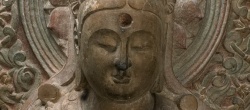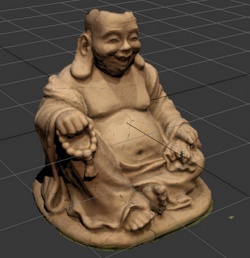Nirvana Sutra: Chapter Ten: On the Four Truths
Mahayana Mahaparinirvana Sutra
Translated by KOSHO YAMAMOTO
FROM Dharmakshema's Chinese version
The World's genuinely first-ever web edition of this complete scripture
(This "Yamamoto/page edition" is Copyright of Dr. Tony Page, 2004 )
The Complete Kosho Yamamoto English Translation of the "Nirvana Sutra", edited and revised by Dr. Tony Page, typographically improved by Jay and Gabriele Mazo
Chapter Ten: On the Four Truths
“The Buddha also said to Kasyapa: "Noble Son! It is not appropriate to term suffering as the Noble Truth (of suffering). Why is that? If one were to term suffering 'the Noble Truth of Suffering', then cattle, sheep, donkeys, horses and the denizens of hell would also have the Noble Truth (of Suffering). Noble Son! Whoever thinks that the extremely profound (gambhira) domain/ sphere/ realm (visaya) of the Tathagata - the eternal, untransforming Dharmakaya (Body of
Truth) - is a body nourished by food, such a person does not know of the virtues and power which the Tathagata possesses. This (i.e. such ignorance of the true nature of the Buddha) is 'suffering'. Why so? Due to ignorance. A person views Dharma as non-Dharma, and non-Dharma as Dharma. Know that this person will fall into the unfortunate realms and repeat birth and death. This will increase the bonds of illusion and worry will grow. If he comes to know that the Tathagata is
Eternal, one with whom there comes about no change, or if he hears the word "eternal", he will obtain birth in heaven. And on gaining emancipation, he will actually see that the Tathagata is Eternal and Unchanging. When this is well seen, he will say: "I heard about this in the past. Now that I am emancipated, I know this. As I was
ignorant regarding the Ultimate, I have been repeating birth and death to no end. Today, I am enlightened as regards true knowledge." If knowledge reaches this stage, this is truly practising suffering. There is much to profit from. One may well practise this, but if one does not know things to be thus, no profit will result. This is what is called knowing suffering. This is the noble truth of suffering. If one does not practise thus, this is suffering and not the noble truth of suffering.
"We say "truth of the cause of suffering". A person does not truly know the Wonderful Dharma and receives what is impure. This is the case of menials. Non-Dharma is called Wonderful Dharma. A person annuls what is right and won't allow it to live. On account of this, that person does not know “Dharmata” (essence of Reality). Not knowing this, he repeats birth and death and suffers greatly. He does not get born in heaven and gain right emancipation. If a person has deep Wisdom and does not
transgress against Wonderful Dharma, he will in consequence be born in heaven and attain right emancipation. If a person does not know where suffering arises and says that there cannot be any Wonderful Dharma or what is Eternal, and that all turns to nothingness, that person, in consequence, will repeat transmigration for innumerable kalpas to come, suffering all kinds of sorrow. If a person says that Dharma is Eternal and that there is no change, this is knowing the cause, and this is the noble truth of the cause of suffering. If one does not so practise, this is the cause of suffering and not the noble truth of the cause.
"We say "truth of the extinction of suffering". If a person practises many things (teachings) and the way of nothingness, this is non-good. Why so? Because this annuls all laws and breaks the true storehouse of the Tathagata. Any practice of this category is the practising of nothingness. One who practises the extinction of suffering acts against what all tirthikas do. If the practice of nothingness is the truth of extinction, there are tirthikas who also practise the teaching of nothingness; we must say that
they too possess the truth of extinction. A person says: "There is the Tathagatagarbha (Buddha-Womb - the pristine mind under cover of illusion). One cannot see this. But if one does away with all illusions, one may indeed enter." It is thus. By the raising of such a mind (i.e. by cultivating such an attitude of mind), one gains freedom in all things. If a person practises the Way of the hidden storehouse, selflessness, and emptiness, such a person repeats birth and death for innumerable ages to come and
suffers from sorrow. A person who does not do such practices may certainly, even though he might have illusion, soon do away with it. Why so? Because he well knows the undisclosed (secret, hidden) storehouse of the Tathagata. This is the noble truth of the extinction of suffering. Any person who practises extinction in such a way is my disciple. A person not practising the Way thus is one who practises emptiness. This is not the noble truth of extinction.
"We say "noble truth of the Way". This is none but the treasures of Buddha, Dharma, Sangha, and right emancipation. All people say with an upside-down mind: "There is no Buddha, Dharma, Sangha, or right emancipation. Birth and death are like phantoms." They hold such views. As a result, they repeat birth and death through the three worlds (of Desire, Form, and Formlessness), suffering there greatly for a long time to come. If the person awakens and comes to see that
the Tathagata is Eternal, that no change comes to him, and that the same applies to Dharma, Sangha, and emancipation, by this one thought the person obtains unmolested (unrestricted) freedom for innumerable ages to come and he may enjoy it as he wills. Why? Because once in the past, due to the four inversions, I took non-Dharma as Dharma and was met by innumerable karmic consequences. When I had made away with such a view, I attained true awakening to Buddhahood. This is the noble truth of the Way. Any
person who says that the Three Treasures are non-eternal and holds this view of life, then this is a false way of practice and is not the noble truth of the Way. If a person practises the Way thus and has it (sees it) as Eternal, such a person is my disciple. He abides in the true view of life and practises the teaching of the Four Noble Truths."
Bodhisattva Kasyapa said to the Buddha: "O World-Honoured One! I now, for the first time, know and practise the great depths of the Four Noble Truths."
Source
Continue Reading
- Nirvana Sutra: Chapter One Introductory
- Nirvana Sutra: Chapter Two: On Cunda
- Nirvana Sutra: Chapter Three: On Grief
- Nirvana Sutra: Chapter Four: On Long Life
- Nirvana Sutra: Chapter Five: On the Adamantine Body
- Nirvana Sutra: Chapter Six: On the Virtue of the Name
- Nirvana Sutra: Chapter Seven: On the Four Aspects
- Nirvana Sutra: Chapter Eight: On the Four Dependables
- Nirvana Sutra: Chapter Nine: On Wrong and Right
- Nirvana Sutra: Chapter Ten: On the Four Truths
- Nirvana Sutra: Chapter Eleven: On the Four Inversions
- Nirvana Sutra: Chapter Twelve: On the Tathagata-DHATU
- Nirvana Sutra: Chapter Thirteen: On Letters
- Nirvana Sutra: Chapter Fourteen: On the Parable of the Birds
- Nirvana Sutra: Chapter Fifteen: On the Parable of the Moon
- Nirvana Sutra: Chapter Sixteen: On the Bodhisattva
- Nirvana Sutra: Chapter Seventeen: On the Questions Raised by the Crowd
- Nirvana Sutra: Chapter Eighteen: On Actual Illness
- Nirvana Sutra: Chapter Nineteen: On Holy Actions-1
- Nirvana Sutra: Chapter Twenty: On Holy Actions-2
- Nirvana Sutra: Chapter Twenty-One: On Pure Actions-1
- Nirvana Sutra: Chapter Twenty-Two: On Pure Actions-2
- Nirvana Sutra: Chapter Twenty-Three: On Pure Actions-3
- Nirvana Sutra: Chapter Twenty-Four: On Pure Actions-4
- Nirvana Sutra: Chapter Twenty-Five: On Pure Actions-5
- Nirvana Sutra: Chapter Twenty-Six: On the Action of the Child
- Nirvana Sutra: Chapter Twenty-Seven: Bodhisattva Highly-Virtuous King-1
- Nirvana Sutra: Chapter Twenty-Eight: Bodhisattva Highly-Virtuous King-2
- Nirvana Sutra: Chapter Twenty-Nine: Bodhisattva Highly-Virtuous King (c)
- Nirvana Sutra: Chapter Thirty: Bodhisattva Highly-Virtuous King (d)
- Nirvana Sutra: Chapter Thirty-One: Bodhisattva Highly-Virtuous King (e)
- Nirvana Sutra: Chapter Thirty-Two: Bodhisattva Highly-Virtuous King (f)
- Nirvana Sutra: Chapter Thirty-Three: On Bodhisattva Lion's Roar (A)
- Nirvana Sutra: Chapter Thirty-Four: On Bodhisattva Lion's Roar (b)
- Nirvana Sutra: Chapter Thirty-Five: On Bodhisattva Lion's Roar (c)
- Nirvana Sutra: Chapter Thirty-Six: On Bodhisattva Lion's Roar (d)
- Nirvana Sutra: Chapter Thirty-Seven: On Bodhisattva Lion's Roar (e)
- Nirvana Sutra: Chapter Thirty-Eight: On Bodhisattva Lion's Roar (f)
- Nirvana Sutra: Chapter Thirty-Nine: On Bodhisattva Lion's Roar (g)
- Nirvana Sutra: Chapter Forty: On Bodhisattva Kasyapa (a)
- Nirvana Sutra: Chapter Forty-One: On Bodhisattva Kasyapa (b)
- Nirvana Sutra: Chapter Forty-Two: On Bodhisattva Kasyapa (c)
- Nirvana Sutra: Chapter Forty-Three: On Bodhisattva Kasyapa (d)
- Nirvana Sutra: Chapter Forty-Four: On Bodhisattva Kasyapa (e)
- Nirvana Sutra: Chapter Forty-Five: On Kaundinya (a)
- Nirvana Sutra: Chapter Forty-Six: On Kaundinya (b)

